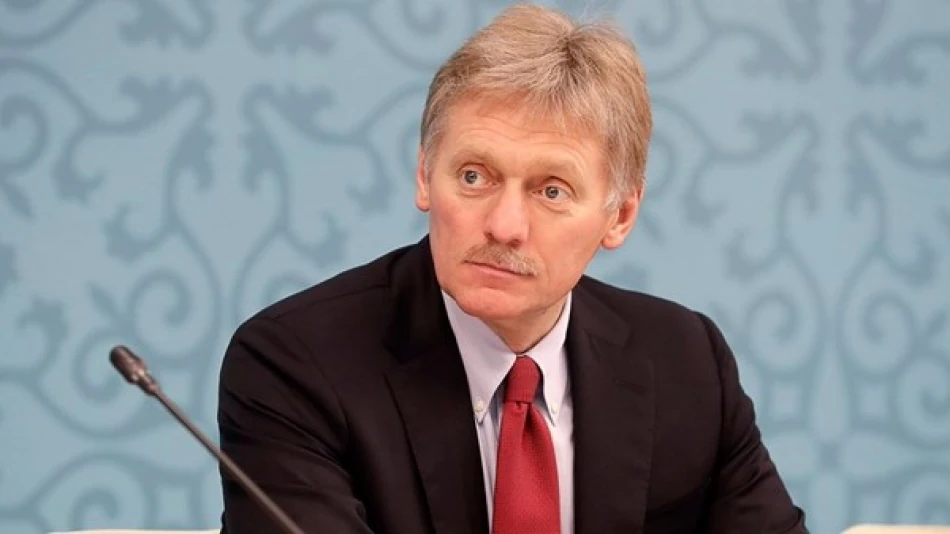
Kremlin Responds to Potential Putin-Zelenskyy Meeting: Exploring the Diplomatic Dynamics
Kremlin Dampens Expectations for Putin-Zelensky Summit as Trump's Diplomatic Push Stalls
Russia has effectively ruled out an immediate meeting between President Vladimir Putin and Ukrainian President Volodymyr Zelensky, casting doubt on Donald Trump's early diplomatic efforts to broker peace talks. The Kremlin's rejection signals that Moscow remains committed to its current military strategy rather than rushing into high-level negotiations that could legitimize Ukraine's position.
Moscow Sets High Bar for Direct Talks
Kremlin spokesperson Dmitry Peskov told media outlets Wednesday that "any high-level or top-level communication must be well-prepared to be effective," effectively dismissing the prospect of a near-term Putin-Zelensky encounter. While Peskov acknowledged that senior Russian and Ukrainian negotiators remain "in contact," no concrete timeline for formal negotiations has emerged.
This measured response reflects Russia's historical approach to diplomatic engagement during conflicts. Moscow typically uses preliminary negotiations to test opponent resolve and extract maximum concessions before committing leadership to direct talks.
Trump's Alaska Gambit Faces Early Resistance
The Kremlin's stance comes after President Trump announced earlier this week that he would assess whether Putin and Zelensky could cooperate to end the war. Trump suggested arranging a meeting between the two leaders following his own planned discussions with Putin in Alaska, though he expressed reluctance to attend such a summit personally.
Trump's preference to facilitate rather than mediate directly represents a departure from traditional U.S. diplomatic practice, where American presidents typically position themselves as central figures in major peace negotiations. This approach may reflect lessons learned from previous failed Middle East and European diplomatic initiatives where heavy American involvement created unrealistic expectations.
Strategic Implications for All Parties
Russia's Calculated Delay
Moscow's reluctance to commit to immediate talks likely stems from military calculations rather than diplomatic intransigence. Russian forces continue advancing in eastern Ukraine, and Putin may believe his negotiating position will strengthen with additional territorial gains before winter weather potentially slows operations.
Ukraine's Diplomatic Dilemma
For Zelensky, any direct meeting with Putin carries enormous domestic political risks. Ukrainian public opinion remains firmly opposed to territorial concessions, and appearing alongside Putin could undermine Zelensky's wartime leadership narrative. However, rejecting peace talks entirely could jeopardize continued Western military support.
Trump's Early Test
The lukewarm response to Trump's diplomatic overture presents an early challenge to his campaign promise of ending the Ukraine conflict quickly. Unlike his previous presidency, Trump now faces a more complex geopolitical landscape where both Russia and Ukraine have entrenched positions backed by years of military investment and casualties.
Historical Context and Precedent
Russia's approach mirrors its strategy during previous conflicts, including the 2008 Georgia war and 2014 Crimea annexation, where Moscow preferred to negotiate from positions of perceived military strength. The Kremlin's insistence on "well-prepared" talks echoes Soviet-era diplomatic doctrine emphasizing extensive preliminary negotiations to establish favorable frameworks before leadership engagement.
This contrasts sharply with Ukraine's preference for immediate international mediation, reflecting Kyiv's belief that prolonged conflict favors Russian resource advantages. The divergent approaches suggest that even arranging preliminary talks may require significant diplomatic groundwork that could extend well beyond Trump's initial timeline expectations.
Most Viewed News

 Layla Al Mansoori
Layla Al Mansoori






